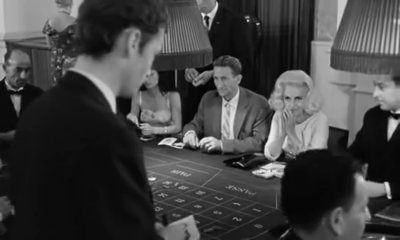We're partners in a game. Let's leave it at that.

From its exhilarating opening, in which the camera irises out and speedily pulls back from Jeanne Moreau standing beside the French Riviera, to the impulsive ending where she leaves the roulette table and runs into the arms of the man who loves her, Jacques Demy's 1963 Bay of Angels rarely stops to catch its breath. In this way, it mirrors the experience of its young protagonist, unassuming bank clerk Jean (Claude Mann), as he plunges headlong into the world of high-stakes gambling after being intoxicated by some beginner's luck. Ignoring the dire warnings of his father (Henri Nassiet), who bluntly tells him that "Gamblers always lose," Jean agrees to go along with a co-worker (Paul Guers) who gambles "on the sly" and whose advice he roundly ignores. With a windfall in his pocket, he decides to forgo his usual family vacation in favor of taking a trip to Nice, where he makes a beeline for the casino and runs into compulsive gambler Jacqueline (a platinum blonde Moreau), who does a lot better with him than she does playing by herself. Their luck changes when they take the show on the road to Monte Carlo, though, and he betrays his unworldliness when he sees what she's willing to do for a chip when she's flat broke.
Between their ups and downs, Demy contrasts Jean's professed pragmatism (he thinks he knows how to stop when he's ahead) and Jacqueline's compulsiveness (she tells him several times that she's going to quit and go home, but she always winds up back at the gaming table). He also lets them enjoy their winnings when they do hit a hot streak -- going out for fancy dinners, buying new clothes, splurging on a flashy convertible, splashing out on a hotel suite -- but there's always another downturn just around the corner. As Jean says at one point, "Luck counts in a game of chance," but when your luck runs out, so do your chances of breaking even.